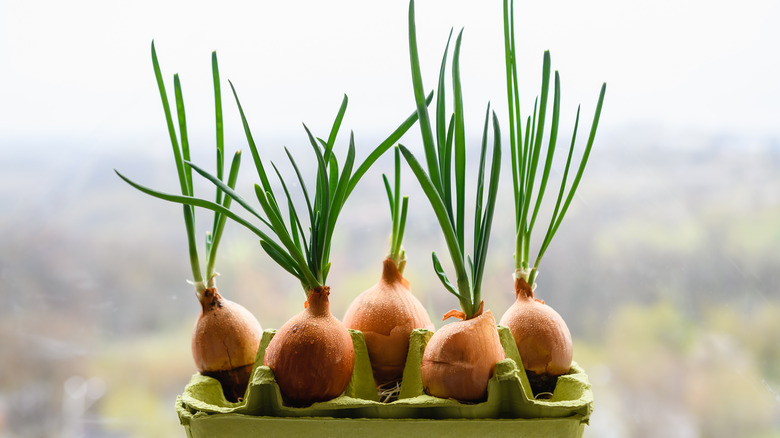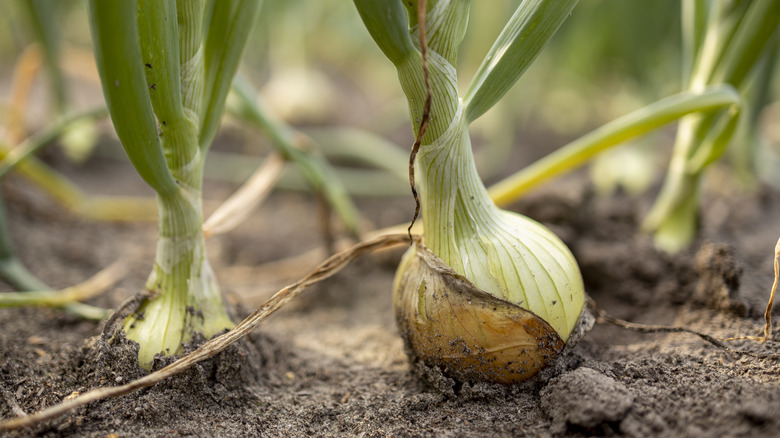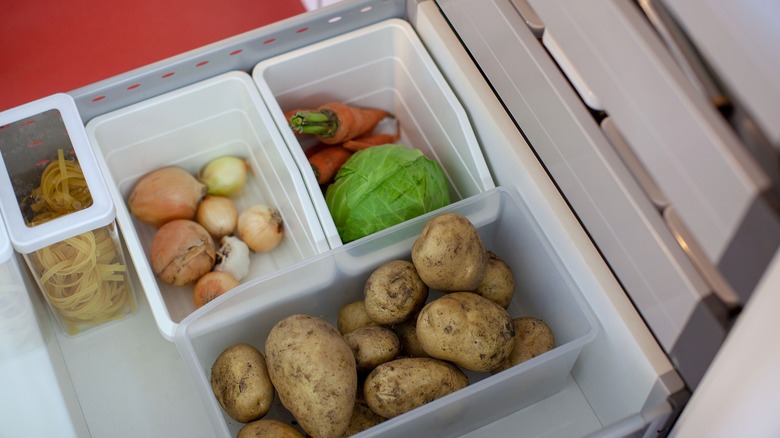Are Sprouted Onions Safe To Eat?
Onions are a cooking staple that's always handy to have on the shelf, but sometimes they can sit there for a long time. It is often easy to tell when an onion has gone bad — they develop black spots on their exterior that turn into mold, and they become a little too squishy — making it an easy decision to toss or compost them. However, sometimes an onion seems perfectly fine except for a thin green sprout growing from its top, reminiscent of something out of "The Thing From Another World."
Traditionally, when something starts to grow on food in the kitchen, it's usually a sign of spoilage. But with onion sprouts, it's perfectly safe to eat them. The sprout isn't an indication of rot, but rather a signal of the onion's flavor profile. Instead of the sweet, crisp, welcome taste and texture expected of an onion, it might taste a bit more bitter and lack the crunch of a fresher vegetable. If faced with the decision to eat — or not to eat — a raw onion with a sprout, it's better to cook it to mask its minor taste imperfections.
When cutting a sprouted onion, remove the green end first and then slice it in half. The core — the deepest layers of the onion — may also contain some green and should be removed. The outer layers are perfectly edible.
Onions sprout because they are a type of bulb
Flowers like tulips, daffodils, and lilies are all examples of bulb perennials. When planted, the stem and flower emerge above ground while the bulb develops in the earth. This bulb acts as a renewable energy source, enabling the plant to grow and bloom over multiple years, with its reproductive system safely stored underground to protect it from the elements.
Onions operate similarly but on a two-year growth cycle, making them biennials. In the first year, the onion seed is planted, and the green part of the plant grows above ground while the bulb — the onion — forms below. The plant then goes dormant for the winter. In the following year, the bulb continues to grow, and the plant produces a flower. Typically, onion bulbs are harvested before their second growth season; however, if left unharvested, they will flower, be fertilized, and produce seeds. This, as Elton John might sing, is "the circle of life."
The onion bulb that has been sitting on the counter too long and has begun sprouting is merely fulfilling its purpose: serving as a food source for the new plant. The sprout depletes the sugars from the bulb, which explains the slightly altered taste of the onion.
Onion sprouting can be prevented with a few simple precautions
The two best friends of the onion bulb, as with most plants, are water and sunlight. If onions are stored where they can access both, they will likely sprout. Therefore, it is recommended to store onions in a cool, dry place such as a drawer, cupboard, or even a cardboard box. It's also important to keep onions and their allium relatives, such as garlic and shallots, separate from potatoes. It's a real "The Odd Couple" situation: Onions cause potatoes to ripen faster, and the moisture content in potatoes can make onions soft.
With one notable exception — you can store green onions in the fridge to last longer — the refrigerator is also detrimental to onions. Alliums should steer clear of the cold, humid environment inside. They will become soggy quickly, and their odor will permeate the rest of the food. Rotten food is indeed something to cry over, so proper storage of onions will save the tears for when they're being chopped.



